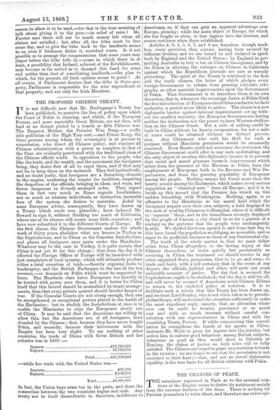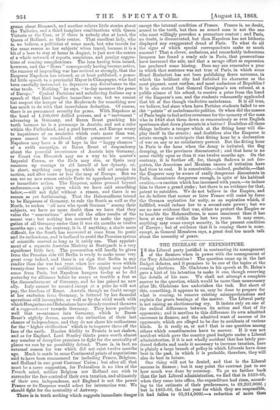THE CHANCES OF PEACE.
THE uneasiness expressed in Paris as to the external rela- tions of the Empire seems to derive its nutriment mainly from the extreme dullness of the time. There is nothing for Parisian journalists to write about, and therefore one writes epi- grams about Bismarck, and another relates little stories about the Tuileries, and a third imagines combinations with Queen Victoria or the Czar, or if there is nobody else at hand, the Queen of Holland, as their centre. That excellent lady, who is, we believe, a politician of some mark, but who travels for the same reason as her subjects' wives travel, because it is a bit of a bore to stay at home in August, is just now the centre of a whole network of reports, suspicions, and gossipy sugges- tions of coming complications. The loan having been issued, however, and the " Bears " consequently having become active, the rumour of impending war has revived so strongly, that the Emperor Napoleon has uttered, or at least published, a peace- ful little speech to a provincial Mayor in Champagne, who had been carefully instructed to deprecate any disturbance to the wine trade. "Nothing," he says, "to-day menaces the peace of Europe." Cynical Parisians and unbelieving Italians say a speech of that kind implies immediate war, but we cannot but suspect the hunger of the Boulevards for something new has much to do with that incredulous deduction. Of course, there is no permanent security for peace. With Napoleon at the head of 1,200,000 drilled persons, and a " movement " advancing in Germany, and Baron Beust gnashing his teeth because he is a personage in Austria, and not a ruler within the Fatherland, and a good harvest, and Europe weary to impatience of an armistice which costs more than war, peace cannot be considered either permanent or secure. Napoleon may have a fit of hope in the "happy chances" of a swift campaign, or Baron Beust of despondency about the peaceful re-entrance of Austria into Germany, or Count von Bismarck may see a way to his master's Imperial Crown, or the Reds may rise, or Spain may summon up courage to rid herself of her dynasty, or, in short, anything may happen which will set armies in motion, and alter more or less the map of Europe. But we can see no new reason outside Paris to apprehend precipitate or immediate action. The Emperor, unless pressed beyond endurance,—a point upon which we have said something below,—will not fight without a reason, and there is no reason as yet forthcoming. That the Hohenzollerns intend to be Emperors of Germany, to rule the South as well as the North, to reckon "all men who speak German" among their subjects, we have no more doubt than we have that they value the " annexations " above all the other results of the recent war ; but nothing has occurred to make the aggre- gation of all Germany easier than it was six months or twelve months ago ; on the contrary, it is, if anything, a shade more difficult, for the South has recovered at once from its panic and its enthusiasm, and is inclined to avoid the Prussian system of scientific control as long as it safely can. That appoint- ment of a separate Austrian Ministry at Stuttgardt is a very significant little fact. The provocation will hardly be given from the Prussian side till Berlin is ready to make some very great coup indeed, and there is no sign that Berlin is any readier than she was last year, when her armies were within twenty-four hours of mobilization. The signal may indeed come from Paris, but Napoleon hungers to-day as he did yesterday for alliances before he essays so terrible a feat as the dismemberment of Germany, and he has gained no new ally. Italy cannot be secured except at a price he will not pay, the freedom of Rome. Austria, though no doubt savage at her exclusion from Germany, is fettered by her financial operations still incomplete, as well as by the vivid wrath with which Hungarians and Bohemians have already received the news of a rapprochement towards Germany. They know perfectly well that re-entrance into Germany, which is Baron Beast's nightly dream, means the extinction of their last chance of independence, and they do not share his enthusiasm for the "higher civilization" which is to improve them off the face of the earth. Russian fidelity to Prussia is not shaken, and as for England, Lord Stanley thinks peace worth almost any number of deceptive promises to fight for the neutrality of places we can by no possibility defend. There is, in fact, no external reason for war which did not exist twelve months ago. Much is made in some Continental prints of negotiations said to have been commenced for including France, Belgium, and Holland in one great Customs' Union ; but after all, that must be a mere suggestion, for Federalism is no idea of the French mind, neither Belgium nor Holland can wish to surrender the free control of their own taxation, and ultimately of their own independence, and England is not the power France or its Emperor would select for internecine war. We should fight for the neutrality of Antwerp.
There is in truth nothing which suggests immediate danger except the internal condition of France. France is, no doubt, armed to the teeth, but then an armed man is not the one who most willingly provokes a premature contest ; and Paris, no doubt, is discontented, but then Napoleon has not hitherto. displayed any exaggerated dread of Paris. To what do all the signs of which special correspondents make so much amount ? That a clever, audacious, and remarkably indecorous. lampoonhas found a ready sale in Paris, that prosecutions- have increased the sale, and that a savage effort at repression has produced some hissing. Does any one remember a year in which that sentence was not true of Paris, in which some Henri Rochefort has not been publishing fierce sarcasms, in which the brilliant city had forfeited its character as the most piquant, most restless, and most audacious of Republics ? It is also stated that General Cavaignac's son refused, at a public seance of his school, to receive a prize from the hand of the Emperor's son, and the students vehemently applauded that bit of fine though vindictive melodrama. It is all true, we believe, but since when have Parisian students failed to see- the " points " of melodramatic politics. Or when did the masses- of Paris begin to feel active reverence for the memory of the man who in 1848 shot them down as remorselessly as ever English sportsmen shot down pheasants in a battue ? Doubtless all these things indicate a temper which at the fitting hour will dis- play itself in the streets ; and doubtless also the Emperor is- astute enough to anticipate that fitting hour by a declaration of war on any or no satisfactory pretext. But the fitting hour in Paris is the hour when the Army is irritated, the flag drooping, or the provinces discontented ; and that hour is no- more visibly upon us than it was twelve months ago. On the contrary, it is further off, for, though Sadowa is not for- gotten, the American and Mexican causes of irritation have- had time to cool. It is conceivable,—indeed, probable,—that the Emperor may be aware of really dangerous discontents in Paris, discontents dangerous enough, in spite of his habitual caution,—a caution which has increased with years,—to induce- him to throw a grand stake ; but there is no evidence for that, patent to outsiders. We do not believe in the Empire, and we do believe that sooner or later France will resist by force the German aspiration for unity, as an aspiration which, if fulfilled, would reduce her to a second-rate power ; but we- see no new evidence that war, either to protect the Empire or to humble the Hohenzollems, is more imminent than it has- been at any time within the last two years. It may come, anything may come except security, in the present condition of Europe ; but of evidence that it is coming there is none, except, as General Menabrea says, a great deal too much talk about the necessity of peace.































 Previous page
Previous page